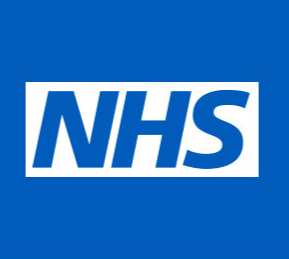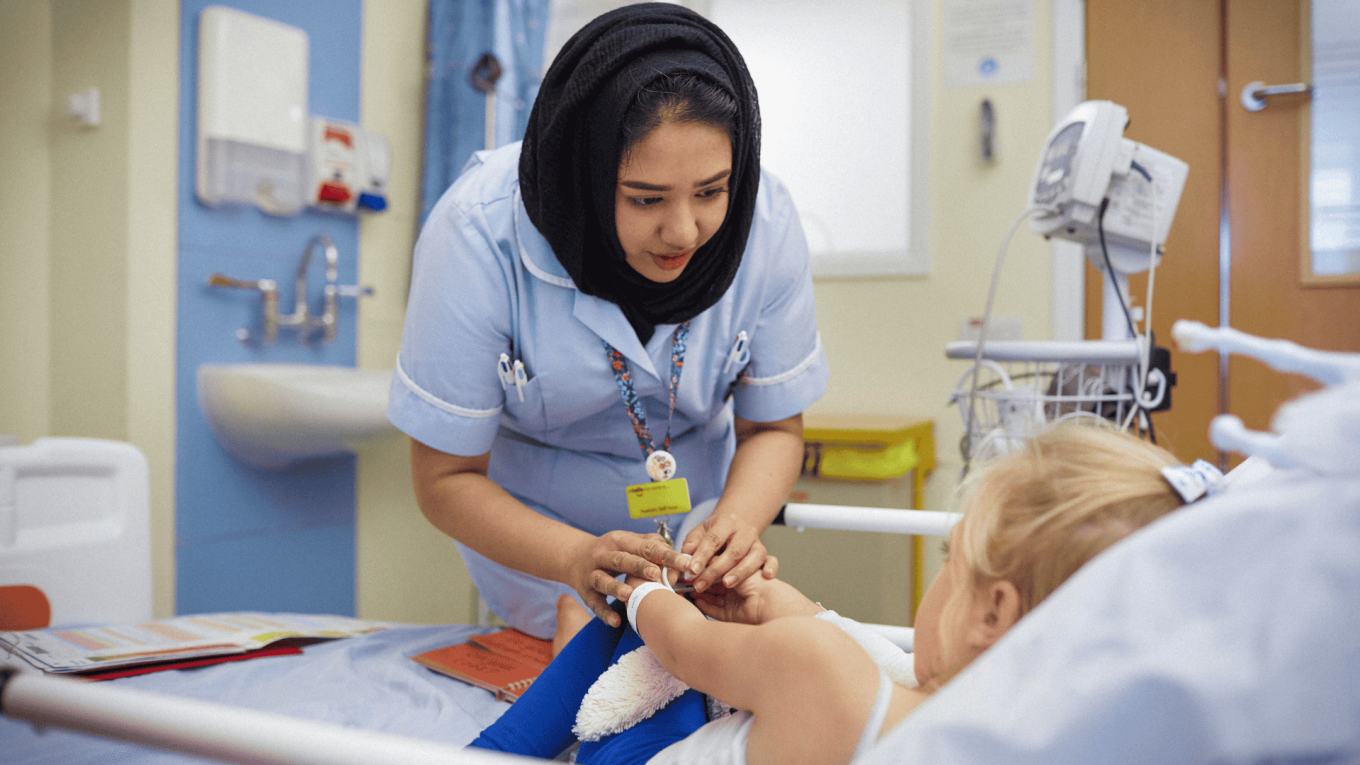
Children's nurse
Children’s nursing encompasses the care and support of babies, children and young people from birth to adolescence. You’ll be supporting the care of a wide range of health conditions from minor injuries to chronic conditions.

On this page
Introduction to the role
The role of a children’s nurse is diverse, as you care for patients from birth through to early adulthood. You may choose to work within an area of speciality such as in neonatal nursing, caring for newborn infants born prematurely, with older children with mental health needs as part of a multi-professional CAMHS (child and adolescent mental health services) in the community or in a more general setting such as a children’s ward or emergency department.
Children aren’t just smaller adults, they have unique health needs, so you’ll need to understand how they grow and develop. You also need to work alongside those who are important to them, whether that’s a parent or guardian, to help them navigate their journey of care.
Because children’s nurses are immersed in every aspect of a patient’s healthcare journey, they are often the ones who identify areas that need improvement, using their problem solving and innovation skills. No two days are ever the same!
About the role
What does a Children’s nurse do?
Children’s nursing is provided in many settings, including hospitals, clinics, day care centres, schools, hospices, youth justice settings and in the community, such as in a baby, child or young person's home.
Your work will be varied and will use science, technology and creative communication skills for tasks such as calculating medication doses or teaching a young person how to use a piece of medical equipment at home.
Effective communication is an essential skill, as you’ll have to communicate complex information to children and young people, adapting to their communication style based on their individual needs. Children and young people may not have the words or ability to communicate pain, discomfort or anxiety so you’ll need to pick up on behaviour and body language to understand what they need.
You’ll work as part of a wider multi-disciplinary team that will include a range of healthcare colleagues such as doctors, allied health professionals (such as physiotherapists, dieticians etc), healthcare support workers, psychologists, social workers, play specialists and youth workers.
What are the pay and conditions like?
As a children’s nurse, a full-time job is 37.5 hours a week, however there are opportunities to work part-time. Many healthcare services provide 24/7 care, therefore you may be expected to work across various shifts which include days, nights, weekends and bank holidays. Employers will review flexible working requests and patterns on an individual basis. Most newly qualified nurses start on band 5 of the NHS Agenda for Change pay scale.
You’ll also benefit from access to the NHS Pension Scheme, a wide range of staff discounts, and at least 27 days of annual leave, plus bank holidays.
Where children’s nursing can take you
Once you have qualified as a children’s nurse, a variety of career paths become available. You may choose to:
- Specialise in a particular field such as diabetes management or working in the community
- work within public health as a health visitor or school nurse
- move into management, teaching or leadership roles
- lead clinical trials as part of a clinical research team
Find a course with UCAS
Want to explore the next step in traditional degree routes into the NHS? Explore courses related to children's nursing with UCAS today.
Person specification
Is children’s nursing right for you?
Academic qualifications are important, but they’re not the whole story. Child nursing involves working closely with children, families and colleagues, often in emotionally challenging situations. You’ll need strong communication and interpersonal skills, good judgement, and the confidence to teach, advise and support others.
Ask yourself:
- Can I stay calm and communicate clearly when under pressure?
- Can I work out what people need and advocate for those who are vulnerable?
Do your values reflect those of the NHS?
Whether you’re applying for a university course or a role in the NHS, you’ll need to show how your personal values align with those in the NHS Constitution. This means demonstrating compassion, respect, and a clear commitment to delivering high standards of care.
Ask yourself:
- Do I take pride in caring for others with kindness and understanding?
- Do I put people at the centre of what I do?
Financial help at university
You could receive at least £5,000 a year to help fund your studies while at university in England. Your personal circumstances and the course you choose may mean you could receive more. And the good news? You'll never have to pay it back.
Entry requirements and training
Studying nursing at university
To become a registered children’s nurse, most people apply for a degree course. These are usually full time and take around three years to complete. They combine academic study with hands-on training in a range of clinical settings. You will spend around half your time studying at university and half gaining practical supervised experience in a range of healthcare settings.
Entry requirements will vary depending on the university, but you’ll typically need:
- at least five GCSEs at grade 4/C or above, including English language or literature, maths and a science
- two or three A levels or equivalent qualifications, such as a BTEC or T Level
Some universities offer foundation year options if you do not meet the standard entry criteria. If you already hold a degree in another subject, you may be able to apply for an accelerated course lasting around two years.
How to apply
To apply for a full-time children’s nursing degree, you’ll need to submit your application through UCAS. As part of the process, you may be invited to an interview or selection day. This is your opportunity to show your motivation, understanding of the profession, and how your values reflect those of the NHS Constitution.
Work or volunteer experience in health or care settings can help strengthen your application.
Other routes into nursing
There are also alternative routes to becoming a registered child nurse, including:
- Nursing degree apprenticeships, which allow you to train and earn a salary at the same time. These are offered by some NHS employers in partnership with universities – find out more on Routes into NHS.
- You could first train to become a nursing associate. This is a registered professional role in its own right, regulated by the Nursing and Midwifery Council (NMC). They provide essential care across diverse settings and are individually accountable for their practice. For those who wish to, the role can also serve as a route into registered nursing through further study.
Some employers support existing staff through training while they continue working.
All nursing courses in the UK must meet NMC standards of education and training but programmes vary in their content, the way they are structured, and how they are taught and assessed. The facilities available and amount of support and supervision may also differ from course to course. Find out more by looking at university websites and prospectuses, attending university open days and contacting admissions staff.
Work experience
Applying for a course or apprenticeship in Children’s nursing is going to be competitive. If you're seriously considering it, it’s a good idea to try and gain some experience to strengthen your application visit NHS England to find out more about gaining work experience for NHS Careers.
Explore NHS Careers
There are over 350 different NHS careers and everyone makes a difference every day. Whether you’re still in education or thinking about changing careers, you'll get the information you need.